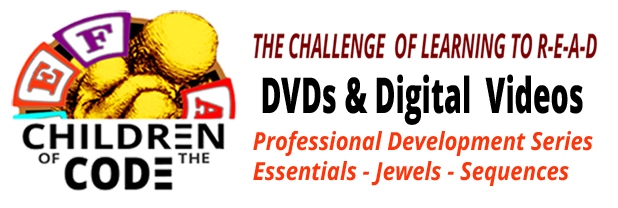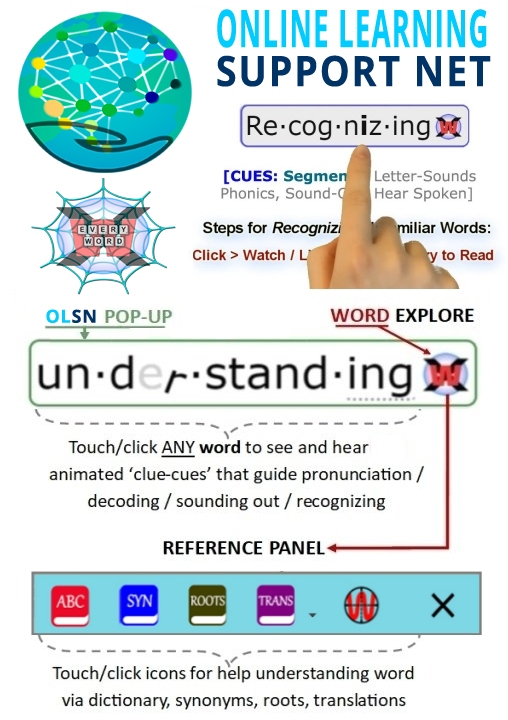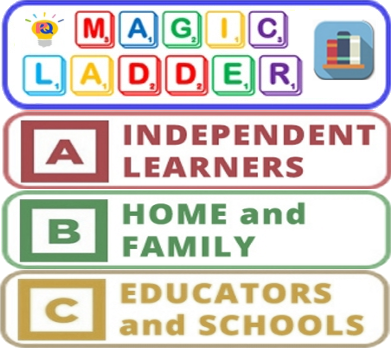All But Fating Our Children’s Lives
… In our society, as it is structured, the inability to be fluent is to consign children to failure in school and to consign adults to the lowest strata of job and life opportunities. Dr. Grover (Russ) Whitehurst, Director, Institute of Education Sciences, U.S. Department of Education. Source: COTC Interview http://www.childrenofthecode.org/interviews/whitehurst.htm#allbutFated
Note: Remember to click on any word on this page to experience the next evolutionary step in technology supported reading.
Children’s Futures all but Fated by Reading
David Boulton: What we’re getting as we start to explore the facets of this is that it seems as if our children’s futures are all but fated, not fated, but all but fated by how well they learn to read.
Dr. Grover (Russ) Whitehurst: Yes, that’s true. Particularly if we go back to the bookend analogy. Those children who are the caboose on the train, at the bookend on the left side of the books, are children who are at substantial academic risk.
Children who are failing at reading at the end of the first grade are extremely likely to be failing at reading at the end of fourth grade. And failure in reading strongly predicts failure in all other academic subjects. So a child who is not breaking the code well, who has not figured it out, who is falling behind, is a child whose academic life course is at risk and because of that whose life is at risk because the economic opportunities of life.
Again, at the lower end of the dimension are ones that have profound effects on not only obvious things: quality of life dimensions, how much money one earns, or the neighborhood one lives in, but actually have effects on longevity, on how long you will live.
So reading again, is absolutely fundamental. It’s almost trite to say that. But in our society, as it is structured, the inability to be fluent is to consign children to failure in school and to consign adults to the lowest strata of job and life opportunities.
Grover (Russ) Whitehurst, Director, Institute of Education Sciences, U.S. Department of Education. Source: COTC Interview – http://www.childrenofthecode.org/interviews/whitehurst.htm#allbutFated
Most of Our Children All but Fated
David Boulton: … it’s also affecting, psychologically, academically and in all these other ways, our population to the extent that we could say: most of our children, to some degree, are having their lives all but fated by how well they learn to read.
Dr. Reid Lyon: Absolutely. And if you look at that figure, that only a small percent of our kids are proficient in what it takes to read, understand and generalize content information, that figure is clearly related to instruction.
G. Reid Lyon, Past- Chief of the Child Development and Behavior Branch of the National Institute of Child Health & Human Development, National Institutes of Health, Current senior vice president for research and evaluation with Best Associates. Source: COTC Interview – http://www.childrenofthecode.org/interviews/lyon.htm#Mostofourchildrenfated
All But Fating
David Boulton: However, relative to reading, everybody seems to agree that most of our children are to some degree having difficulty with it. It’s all but fating their lives.
Dr. Louisa Moats: Right.
David Boulton: According to Reid Lyon and James Wendorf, ninety-five percent of the children that are struggling with reading are instructional casualties.
Dr. Louisa Moats: Yes.
David Boulton: It’s a consequence of an unnatural, overwhelming ambiguity forced upon the child while nobody is giving them a stairway through it before they shame–out to the process. The shame itself then impedes their cognitive ability to process it, as well as diminishes their self-esteem in general with all of its transferred effects.
So we have this massive problem that when we cut it down has to do with the social-educational paradigm-inertia.
Dr. Louisa Moats: And why is that the case? You’re extremely articulate about it.
Louisa Moats is the Director of Professional Development and Research Initiatives at Sopris West Educational Services. Author: Speech to Print: Language Essentials for Teachers, Parenting a Struggling Reader, and LETRS (Language Essentials for Teachers of Reading and Spelling). Source: COTC Interview – http://www.childrenofthecode.org/interviews/moats.htm#AllButFating
All but Fated by How Well They Learn an Archaic Technology
David Boulton: One of the things that gets me though, is that what we’re saying in effect is that the majority of our children, to some degree, are having their lives all but fated by how well they learn to interface with an archaic technology.
Dr. Reid Lyon: Well, by archaic technology, if you mean lousy teaching…
David Boulton: No, I mean by the code itself.
Dr. Reid Lyon: Well, I see what you mean. We’re not going to change the code, I’m sure.
David Boulton: Whoa, whoa, whoa…
Dr. Reid Lyon: Yeah.
David Boulton: I agree that we’re not going to change the code. I’ve been a student of the hundreds of years of many attempts to change it.
Dr. Reid Lyon: Right.
David Boulton: But though we haven’t been able to change it, I think that there’s something to be gained by trying to understand it.
Dr. Reid Lyon: Absolutely.
David Boulton: How much of this problem is connected to the ambiguity that’s pent up in this code and where it came from?
Dr. Reid Lyon: There are scholars, as you know, who study this up the wazoo and know how the Latin and Greek influences and other influences effected …
David Boulton: The collision between two different language systems…
Dr. Reid Lyon: Right.
David Boulton: That resulted in this great ambiguity.
Dr. Reid Lyon: Right. But we can look at very transparent languages like Spanish and you’ll probably still see a very limited number of proficient kids, all things being equally matched on background and environment and all of that. In other words, you do see similar difficulties even in transparent languages. And it is referring…
David Boulton: Do you have studies on that you can send me?
Dr. Reid Lyon: Sure.
David Boulton: Okay.
Dr. Reid Lyon: In other words…
David Boulton: And indexed against how much time and instruction has gone in?
Dr. Reid Lyon: Well, I don’t know if we’ve done it that well.
G. Reid Lyon, Past- Chief of the Child Development and Behavior Branch of the National Institute of Child Health & Human Development, National Institutes of Health, Current senior vice president for research and evaluation with Best Associates. Source: COTC Interview – http://www.childrenofthecode.org/interviews/lyon.htm#fatedarchaic
Learning to Read is All But Fating
David Boulton: What we’re saying is that how well children learn to read is all but fating to their academic, economic, psychological, intellectual, and cognitive health – that it’s that pervasively powerful. A great deal of this depends on the soundness of the instructional process, the educational process and also on the preparation of the child long before they get to school, how well they are unfolding. That it is in fact critical, how they come to school, how well they’ve started to develop and exercise the kind of sound and letter distinctions and familiarity with the correspondence between oral and written language, which are the ideal ground to pick up from and move with in education. That solidly rests on the parents.
James Wendorf: All of us have a responsibility to kids, to our youngest kids. Certainly parents have that responsibility to help them develop the language skills, the literacy skills so that they are ready to embrace school when the time comes. And it’s true that children who come from backgrounds of poverty are at a tremendous disadvantage. By the time they actually enter kindergarten, they’re lagging in skill development and their vocabularies are dwarfed by the vocabularies of children of middleclass and upper-middle class homes who’ve been surrounded by language in very different ways.
And so they enter the school door, they enter the classroom really lacking the equipment, lacking the context to even understand a lot of what the teacher might be saying. They don’t know the names of things. It’s not just that they don’t know, in many cases, the letters of the alphabet. It’s that they don’t know the names of things. They lack language.
James Wendorf, Executive Director, National Center for Learning Disabilities. Source: COTC Interview – http://www.childrenofthecode.org/interviews/wendorf.htm#LearningtoReadisAllButFating
Prison Building Programs Based on Literacy Rates
David Boulton: Now I’d like to invite you to go into this question that I asked earlier about the relationship between learning disabilities in the field and reading, and reading as a learning-disabling process for those that don’t get it.
Rick Lavoie: Right.
David Boulton: To an extent that it’s just mind-boggling to me, when we look at the various things children are at risk for, that they might develop that could do harm to their lives, that could diminish their potential in life, the risk of having some reading-related difficulty that can harm their life is greater than everything else we pay attention to combined.
Rick Lavoie: Absolutely. Reid Lyon talks all the time about the number of states in the United States who use reading skill levels in third grade to project how many prisons they’re going to need twenty years down the line. That’s horrifying to think of that, but they really do. Their prison-building programs are based on the literacy rates in the third grade and they’re figuring in twenty years they’re going to need this many prisons based on the number of kids who can’t read in third grade. That’s how close the correlation is. That’s how real the correlation is.
David Boulton: What we’re basically saying is this comes back to the shame avoidance, the kind of things that you’ve been talking about. What we’re saying is that children that struggle with learning to read become self-disabled in some ways. Their relationship with themselves becomes disabled. They become more prone to social pathology, and it radiates, at massive expense to our society as a whole and to our population as a whole, to such an extent that this is the nation’s greatest learning disability.
Rick Lavoie: There are a number of schools within the field of education; in terms of the way we view the relationship between reading and learning. I come from the school where the inability to read is a symptom of a larger language problem. The overwhelming majority of kids who have difficulty, who have learning problems, have difficulty reading. And the overwhelming majority of kids with reading problems also have learning problems. So, I have a difficult time teasing the two of them away because they are so fundamental and so interlocked.
Rick Lavoie, L.D. and Special Education Professor, Source: http://www.childrenofthecode.org/interviews/lavoie.htm#PrisonBuildingPrograms













